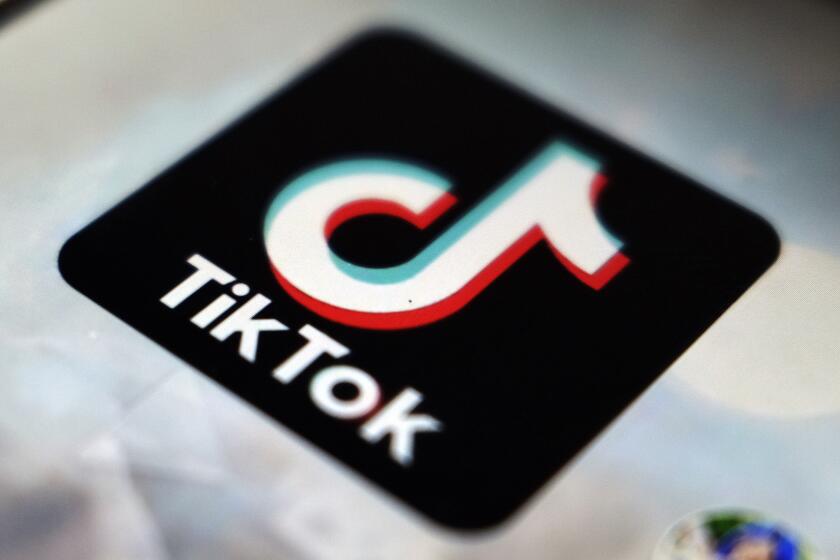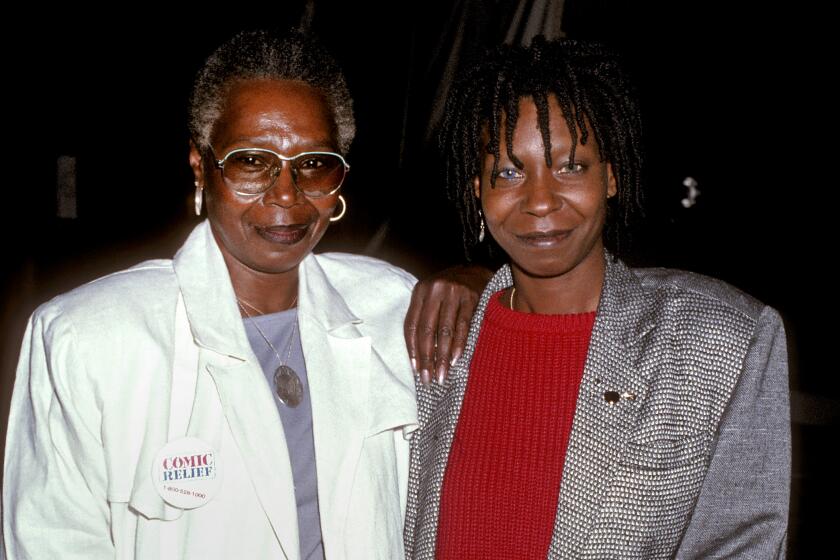Solidarity is the way to team spirit
All things considered, the Gatorade was a fitting symbol of the whole disheartening mess.
As a thirst-quenching drink for tired competitors seeking an energy refill to carry them through the next grueling stretch of hardship, it made perfect sense that a number of picketing Writers Guild of America members clutched and swigged from the lightning bolt-marked bottles as they marched in front of Paramount Studios last week. After thorny contract negotiations between the Alliance of Motion Picture and Television Producers and the WGA had all too predictably crashed to the ground the week before, the writers needed to bolster their fortitude any way they could.
That several of those fruity beverages were quietly spiked with a shot of Ketel One vodka signaled either the impending desperation of their situation, burbling beneath the surface, or a playful thumb in the eye of doomsday prognostications. One hammy scribe joked that the presence of alcohol represented the “dark-night-of-the-soul” moment for a protagonist two thirds of the way through a typical three-act screenplay. You know, the one just before he achieves redemption and triumphs over his persecutors.
As another tongue-in-cheek-theme day to increase picket-line turnout, the 10 a.m. to 1 p.m. shift at Paramount’s hopping Bronson gate had unofficially been dubbed Drunk Tuesday. That the low-key event had been bumped a few times meant it was taking place in the charred aftermath of the latest negotiation implosion.
“Last week it [would have been] like, ‘Let’s have a party, we’re keeping it fun,’ ” said the event’s organizer, Dana Fox (“The Wedding Date”), as she quickly informed a woman reaching into the curbside plastic foam cooler of its value-added contents. “This week everybody’s spirits are kind of down because there’s a sense of real disappointment that the negotiations broke off again. So now it’s more, ‘Buck up, we’re in this for the long haul.’ ”
“I don’t think last week we really believed things were going that well, either, did we?” joked Tracy Poust to fellow “Ugly Betty” staff writer Sheila Lawrence.
“We might be revising history,” mused Lawrence. “I feel like there was a little bit more hope last week. But there’s still as much resolve.”
Many picketers professed surprise that there seemed to be more people on the line this week than the one before. And by all appearances, spirits remained fairly high. Craig Gerber, Court Young and strike captain Matt Eddy danced a jig to Al Green’s “Love and Happiness,” curling out of a boom box perched between the two gates. SAG members weaved and chatted among the WGA faithful as cars periodically pulled in and off the lot, some adding a quick, supportive tap on the horn.
“People are fighting to stay optimistic and cheerful,” said Jose Rivera, Oscar-nominated screenwriter of “The Motorcycle Diaries.” “Everyone seems to be pretty up. The feeling is that we’re not going to abandon the line. We’re not going to show any less resolve. That’s held steady.”
Rivera then nodded toward the small can of Double Shot coffee he was drinking and smiled. “This actually really is Starbucks.”
(There was mild controversy about the booze; many declined the offer -- it was, after all, still before noon. Several picketers refused to have their picture taken holding the telltale Gatorade bottle, and at least one writer, Cinque Henderson, worried aloud about what horrible negative spin the AMPTP’s new PR phalanx could conjure out of it.)
And yet, the line appeared to be unified in its contempt for the latest “horrendous” deal offered by the studios. A common refrain among WGA members since the Nov. 5 strike start has been that even people unhappy with the leadership’s negotiating tactics are unequivocal about the need to strike.
Or as John Turman (“Hulk”) put it recently: “This is the big story: Even people who despise Patric [M. Verrone, WGA president] and his strategies are 100% behind this. They may not have wanted to go out, they may not have liked how it happened, but when the deal was offered, there was absolutely no split there.”
“In a way, it’s taken the panic out of it,” said Poust of the latest offer. “We just say, ‘This is what we have to do right now until there’s a radical change.’ ”
That “radical change” alludes to what many in the guild, from the top leadership down, have tried to articulate over the last six months, that this debate with their employers extends beyond the particulars of the next three-year contract, the decimal points and new-media revenue streams. As they see it, the precedents and nature of this deal will lay down a blueprint for the status of Hollywood writers for decades to come.
“It’s about the survival of writing as a business, as a career,” said A-list screenwriter Stuart Beattie (“Collateral,” “G.I. Joe”) recently. “If everything’s on the Internet in 20 years and my kids want to be writers, it’ll have to be a hobby. Because the way the studios are going right now, they don’t want to pay for it.”
“We will lose more money on this strike than we will ever make,” said Poust. “It’s not for us. It’s for future generations.”
“There are a lot of writers who feel like [the studios] are trying to break down our union and other unions to come and [are] using this opportunity of a changing method of distribution to do it,” said Lawrence. “TV as we know it I don’t think will exist in five years, and that’s a good time for certain powers to try to change the entire structure of how creative people are paid. One of the things that’s tricky about the argument is no one knows exactly what it will be, so what we’re trying to do is protect ourselves against whatever it might become. And to try to fight that fight after it has already changed, you’ll never get your gains back.”
Fox says she found hostility to the strike among her friends back East who claimed it was all about money.
“It’s about intellectual property and it’s about fairness, and yes, the only way that we can quantify that is money,” she said she argued. “But it’s really about the future and feeling like what you do matters.”
Which is another way of defining respect, from the industry titans whose stance seems to echo Jack Warner, who in another era dismissed the entire writing community as “schmucks with Underwoods.”
“It seems to be the one constant from the beginning of Hollywood, that writers never get the respect they think they deserve,” said Andy Callahan, who just sold his first TV movie script to Lifetime and is ultimately hoping to join the WGA. “And I’m not sure that that’s going to change with this strike.”
“Everybody’s read the brochure,” added Jon Lucas (“The Ghosts of Girlfriends Past”). “We’re not F. Scott Fitzgerald. We weren’t the first crop of really great novelists who came out here and were like, ‘I’m shocked that we’re disrespected!’ Everyone who comes out here kind of knows that’s what they’re getting into.”
“The goal is to get a contract we’re happy with,” said Callahan. “And we can agree to disagree on the respect issue.”
--
Jay A. Fernandez writes the Scriptland column, a weekly feature on the work and professional lives of screenwriters. fernandez_jay@hotmail.com.
More to Read
The biggest entertainment stories
Get our big stories about Hollywood, film, television, music, arts, culture and more right in your inbox as soon as they publish.
You may occasionally receive promotional content from the Los Angeles Times.






